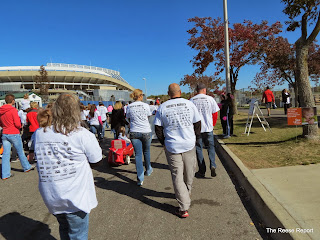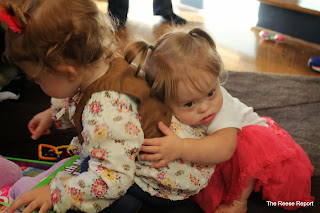I can't think of a better way to close out the month than with a piece from Uncle Michael. I should mention that his wife nixed this essay. She wanted him to write something else. But I think it's perfect, in a sense that only my brother can achieve. Enjoy.
I'll be honest. I have nothing.
Last year, I delivered a piece that was, perhaps, a little emotionally manipulative. I am told
that people cried. As a person, I'm sorry about that. As a writer, I'm
unapologetically proud.
Back then I was just making sense out of what it meant to
have a niece with Down syndrome. There was the initial shock, and then the
sadness, and then the shame at being sad, as if wanting her not to have Down
syndrome was somehow an affront to her existence, the kind of self-serving
desire that exposes the tension between what we want and what she is. It
messes with your head, this chromosome. On the one hand, I wish she didn't have
it. On the other, I wouldn't have her any other way.
But that stuff fades. In truth, I just don't think about it
much anymore. I have that luxury. I'm not her parent. I don't have to think
about Reese's orthotics or where she'll go to school. I don't concern myself
with low muscle tone or gross motor skills.
I'm just her uncle, someone who sees her often, but nowhere
near daily. For me, Reese has become an utterly unremarkable child, and I mean that
in the best possible way.
Since I last wrote, Reese's family has grown. She is now one
of three girls. And here are some things I've observed in that time. Reese is
funny. But she's not funnier than her big sister. She's adorable. But she's no
more adorable than the baby.
She loves the circus. But not more than my son. She likes to
dance. But not more than my daughter. She enjoys a good birthday party. But not
more than any kid I know.
She's a ray of sunshine, a singular snowflake. She's all
those greeting-card clichés. But the world is full of sunshine and snowflakes.
Reese is just a sweet little girl.
That's what I mean when I say I have nothing. I have nothing
profound to say about having a niece with Down syndrome anymore, because I
don't think about having a niece with Down syndrome much anymore. That's not to
say that I'm above that sort of thing. I'm no stranger to prejudice and stigma.
I know what it's like to be ashamed of my own thoughts. But more and more, I
have come to realize that the things we fear most are abstractions, the traits
we know a little about but don't really understand in any tangible way.
I grew up in a time and place that was very white, very sectarian,
very straight. And I remember the jokes and the offhand prejudice from people
who should have known better. But they didn't know better because they didn't
know anyone who wasn't like them. And then I went to college and then out into
the world, and the more people I met, the more I understood that our different
qualities were points of interest, not lines of demarcation.
I met people of different races. I met people of different
faiths. I met people of a different sexual orientation. And in a short span
they went from exotic creatures to folks who were like me in more ways than
they were different. I recently spent a long weekend with one of my closest
friends, a guy who happens to be (and what an insidious phrase "happens to
be" is) Jewish. We spent a lot of time talking about rock and roll bands.
Circumcision never came up.
And in the little time I now spend thinking about Down syndrome, I think of it in the same way. Reese has one trait that makes her different from her sisters, but she has dozens that make her more like them.
Before Reese, I had encountered people with Down syndrome,
of course, but I didn't really know any of them. Now I know and love someone
with that extra chromosome, and most days it's no more consequential to me than
my friend's faith. It puts no space between us. It's just a point of interest.
I suppose I'm just trying to say this: Reese is an utterly
unremarkable child, and I mean that in the best possible way.
































































